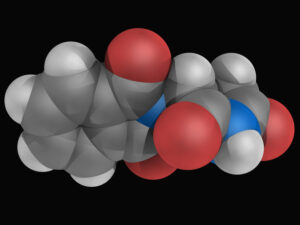Small-intestinal angiodysplasia (SIA), characterized by vascular malformation in the GI tract, is the most common cause of recurrent bleeding in the lower intestine and can be challenging to treat. Previous studies have been limited in sample size but have shown promising results for the treatment of SIA associated bleeding with thalidomide, which decreases the expression of vascular endothelial growth factors. Results from a placebo-controlled, randomized, double-blinded trial in China confirm that thalidomide treatment decreases bleeding in patients with SIA. During the study, 150 adult patients (62 years, median age; 59% female) with at least four bleeding episodes due to SIA in the 12 months leading up to the study were randomized to receive either 100 mg thalidomide (n=51), 50 mg thalidomide (n=49), or placebo (n=50) daily for 4 months. In the year following the 4-month treatment period, 69%, 51% and 16% of patients in the 100 mg, 50 mg, and placebo groups had at least 50% fewer bleeding episodes as compared to the year pre-treatment (p<0.001 for simultaneous comparison across groups). Furthermore, treatment with thalidomide increased hemoglobin levels and reduced the need for blood transfusions and hospitalizations due to bleeding. Grade 1 and 2 adverse events were common, but no serious adverse events were observed. Further studies are needed to confirm the safety and efficacy of thalidomide to treat SIA.
Reference:

